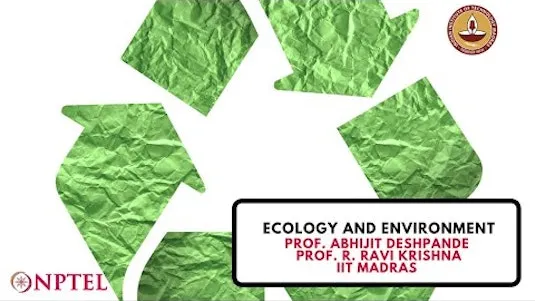
Reclaiming Broken Places: Introduction to Civic Ecology 
This course introduces the concept of Civic Ecology, which focuses on the actions of ordinary people in urban renewal and ecology. It explores how people from around the world come together to reclaim blighted vacant lots and transform them into vibrant green spaces, restoring their communities and environment. ▼
ADVERTISEMENT
Course Feature
![]() Cost:
Cost:
Free
![]() Provider:
Provider:
Edx
![]() Certificate:
Certificate:
No Information
![]() Language:
Language:
English
![]() Start Date:
Start Date:
Self paced
Course Overview
❗The content presented here is sourced directly from Edx platform. For comprehensive course details, including enrollment information, simply click on the 'Go to class' link on our website.
Updated in [March 06th, 2023]
This course, Reclaiming Broken Places: Introduction to Civic Ecology, provides an exploration of the people, places, and practices that restore nature and revitalize neighborhoods. Learners will discuss and evaluate contemporary thinking in resilience, social-ecological systems, and the relationship between nature and human/community wellbeing. They will gain an understanding of how civic ecology enables those with limited resources to defy and cope with daily struggles, including after disaster and war. The course will also provide learners with the knowledge and skill set to enact change in their own community. Through a civic ecology service learning project, learners will turn classroom learning into real-life application. This course is ideal for a learner who is intrigued by both social and environmental concerns, or simply has a desire to dive into an emerging 21st century, cross-disciplinary subject area. Upon completion, learners will have a keener awareness of social-ecological issues and concerns, as well as a greater knowledge of the practical steps required to rebuild and maintain community and nature in a world marked by inequality, conflict, and climate change.
[Applications]
Upon completion of this course, learners can apply their knowledge of civic ecology to their own communities. They can use the skills and understanding acquired to enact change in their local environment, such as community gardening, wetlands restoration, river cleanups, and tree planting. Learners can also use the knowledge gained to help their communities cope with daily struggles, including after disaster and war. Additionally, learners can use the service learning project to apply their classroom learning to real-life situations.
[Career Paths]
Recommended career paths for learners of this course include:
1. Community Organizer: Community organizers work to build relationships between individuals and organizations in order to create positive change in their communities. They work to identify and address issues such as poverty, environmental degradation, and social injustice. This role is becoming increasingly important as communities face the challenges of climate change and other environmental issues.
2. Environmental Educator: Environmental educators work to educate people about the importance of protecting and preserving the environment. They use a variety of methods, such as lectures, field trips, and hands-on activities, to teach people about the environment and how to protect it. This role is becoming increasingly important as more people become aware of the need to protect the environment.
3. Urban Planner: Urban planners work to create and implement plans for the development of cities and towns. They work to ensure that cities are designed in a way that is sustainable and equitable, taking into account the needs of the environment and the people who live there. This role is becoming increasingly important as cities become more densely populated and the need for sustainable development increases.
4. Environmental Scientist: Environmental scientists work to study and understand the environment and its effects on humans and other living things. They use their knowledge to develop solutions to environmental problems, such as pollution and climate change. This role is becoming increasingly important as the effects of climate change become more apparent and the need for solutions grows.
[Education Paths]
Recommended Degree Paths:
1. Environmental Science: Environmental Science is a multidisciplinary field that focuses on the study of the environment and its interactions with humans. It combines elements of biology, chemistry, physics, and other sciences to understand the natural world and how it is affected by human activities. This degree path is ideal for learners interested in the science behind civic ecology and how it can be used to restore nature and revitalize neighborhoods.
2. Urban Planning: Urban Planning is a field of study that focuses on the development of cities and towns. It involves the analysis of land use, transportation, housing, and other infrastructure to create sustainable and equitable communities. This degree path is ideal for learners interested in the practical steps required to rebuild and maintain community and nature in a world marked by inequality, conflict, and climate change.
3. Social Ecology: Social Ecology is a field of study that focuses on the relationship between humans and the environment. It examines how humans interact with and shape their environment, and how the environment in turn shapes human behavior. This degree path is ideal for learners interested in understanding how civic ecology enables those with limited resources to defy and cope with daily struggles, including after disaster and war.
Developing Trends:
1. Environmental Science: With the increasing awareness of climate change and its effects, there is a growing demand for professionals with expertise in environmental science. This has led to an increase in research and development in the field, as well as an increase in job opportunities.
2. Urban Planning: As cities become more crowded and complex, there is an increasing need for urban planners to help create sustainable and equitable communities. This has led to an increase in research and development in the field, as well as an increase in job opportunities.
3. Social Ecology: With the increasing awareness of the importance of social-ecological systems, there is a growing demand for professionals with expertise in social ecology. This has led to an increase in research and development in the field, as well as an increase in job opportunities.
Course Provider

Provider Edx's Stats at AZClass
Reclaiming Broken Places: Introduction to Civic Ecology introduces the concept of urban ecology, focusing on the actions of ordinary people in urban renewal and ecology. It explores how people from all over the world come together to reclaim destroyed vacant spaces and transform them into vibrant green spaces, restoring their communities and their environments. In the study of urban renewal and urban ecology, the behavior of ordinary people is often missing. All over the world, people fed up with environmental degradation and the breakdown of communities have come together to renovate vacant spaces, broken stream corridors, polluted estuaries and other broken places.
Discussion and Reviews
0.0 (Based on 0 reviews)
Explore Similar Online Courses

Architecting Microsoft Azure Solutions

Fundamentals of Nanoelectronics Part B: Quantum Transport

Python for Informatics: Exploring Information

Social Network Analysis

Introduction to Systematic Review and Meta-Analysis

The Analytics Edge

DCO042 - Python For Informatics

Causal Diagrams: Draw Your Assumptions Before Your Conclusions

Whole genome sequencing of bacterial genomes - tools and applications

South Asian Religions & Ecology

MGPE-014: Gandhi: Ecology and Sustainable Development


Start your review of Reclaiming Broken Places: Introduction to Civic Ecology